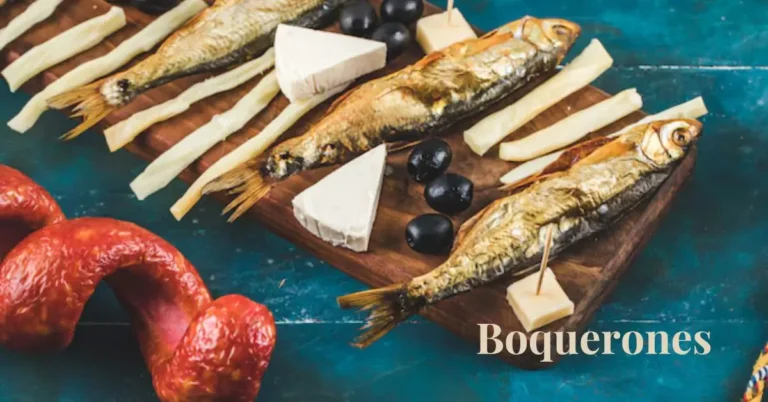In the diverse tapestry of Spanish cuisine, boquerones stand out as a cherished ingredient, offering a unique blend of flavor and tradition. These small, silver fish, known scientifically as Engraulis encrasicolus, have been a staple in Mediterranean diets for centuries. This article delves into the history, preparation, culinary uses, health benefits, and cultural significance of boquerones, providing a comprehensive overview of this remarkable ingredient.
Historical Background
Origins and Historical Significance
Boquerones, commonly known as anchovies in English, have been a part of Mediterranean diets since ancient times. The fish’s historical roots trace back to the Greeks and Romans, who recognized their value not just as a food source but also as a commodity in trade. The word “boquerón” itself is derived from the Spanish term for anchovy, and it reflects the deep-seated appreciation of these fish in Spanish culture.
The use of anchovies can be documented in various ancient texts, highlighting their importance in preserving and enhancing flavors. In Spain, they became integral to the regional cuisine, particularly in coastal areas where fresh seafood was abundant.
The Role of Boquerones in Spanish Cuisine
In Spain, boquerones are enjoyed both fresh and preserved. The fresh variety is usually marinated, while the preserved ones are commonly found in cans. Both forms have distinct culinary uses, reflecting the versatility of this fish in Spanish cooking.
Preparation Methods
Fresh Boquerones
Marinating Process
Fresh boquerones are often marinated to enhance their flavor and ensure their preservation. The typical process involves cleaning the fish thoroughly, removing the heads and guts, and then marinating them in a mixture of vinegar, water, garlic, and herbs. This process not only adds a tangy flavor but also makes the fish tender and ready to be served as an appetizer or tapa.
Serving Suggestions
Marinated boquerones are often served with olive oil, lemon, and a sprinkle of parsley. They can be enjoyed on their own or used as a topping for salads and tapas. Their tangy flavor and tender texture make them a popular choice for those who enjoy seafood with a bit of a kick.
Preserved Boquerones
Canning Process
Preserved boquerones are typically packed in oil or salt. The canning process involves cleaning and gutting the fish, then packing them in containers with oil, salt, or a combination of both. This method of preservation ensures that the fish retains its flavor and can be stored for long periods.
Culinary Uses
Canned boquerones are versatile and can be used in a variety of dishes. They are often added to salads, pasta dishes, and pizzas. The rich, umami flavor of the preserved fish complements a wide range of ingredients, making it a valuable addition to any pantry.
Culinary Applications
Traditional Spanish Dishes
Ensalada de Boquerones
Ensalada de boquerones, or anchovy salad, is a classic Spanish dish that highlights the fish’s flavor. The salad typically includes marinated boquerones, fresh vegetables such as tomatoes and onions, and a simple dressing of olive oil and vinegar. This dish is often enjoyed as a light lunch or as a starter for a more elaborate meal.
Tapas
Boquerones are a staple in Spanish tapas culture. They are often served alongside other tapas items such as patatas bravas, croquettes, and olives. The combination of flavors and textures in a tapas spread offers a quintessential Spanish dining experience.
Modern Interpretations
In recent years, chefs have begun experimenting with boquerones in innovative ways. Modern dishes might include boquerones in gourmet salads, as a topping for gourmet pizzas, or even in fusion cuisine where they are combined with non-traditional ingredients.
Nutritional Value and Health Benefits
Nutritional Profile
Boquerones are not only delicious but also offer several health benefits. They are a rich source of omega-3 fatty acids, which are essential for heart health. Additionally, they provide protein, vitamins, and minerals that contribute to overall well-being.
Omega-3 Fatty Acids
The omega-3 fatty acids found in boquerones are known to support cardiovascular health by reducing inflammation and lowering cholesterol levels. These healthy fats are also beneficial for brain function and can contribute to improved cognitive performance.
Protein Content
Boquerones are an excellent source of high-quality protein. Protein is essential for muscle repair and growth, and it plays a crucial role in maintaining a healthy metabolism.
Vitamins and Minerals
Boquerones provide several essential vitamins and minerals, including vitamin B12, vitamin D, calcium, and iron. These nutrients are important for maintaining bone health, supporting red blood cell production, and ensuring overall metabolic function.
Potential Health Concerns
While boquerones are generally considered healthy, it is important to be mindful of their salt content, especially in preserved forms. Excessive salt intake can lead to high blood pressure and other health issues. Moderation is key to enjoying the health benefits of boquerones while minimizing any potential risks.
Cultural Significance
Boquerones in Spanish Culture
Boquerones hold a special place in Spanish culinary traditions. They are often associated with social gatherings and festive occasions, where they are enjoyed as part of a larger spread of tapas. The fish’s presence on the table reflects the Spanish emphasis on communal dining and the enjoyment of good food with friends and family.
Regional Variations
Different regions of Spain have their own variations on how boquerones are prepared and served. For example, in Andalusia, boquerones en vinagre (marinated anchovies) are a popular tapa, while in the Basque Country, they might be served in more elaborate preparations.
Conclusion
Boquerones are much more than just a small fish; they are a culinary treasure that embodies the flavors and traditions of Spain. Whether enjoyed fresh or preserved, in traditional dishes or modern creations, boquerones offer a unique taste of Mediterranean cuisine. Their rich history, diverse preparation methods, and significant health benefits make them a valuable addition to any diet.
As Spanish cuisine continues to gain global recognition, the humble boquerón stands as a testament to the depth and richness of Spain’s culinary heritage. Whether you’re a seasoned chef or a curious food enthusiast, exploring the world of boquer ones promises a rewarding and flavorful experience.

